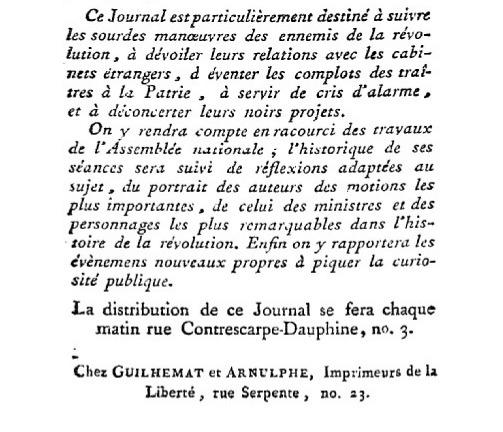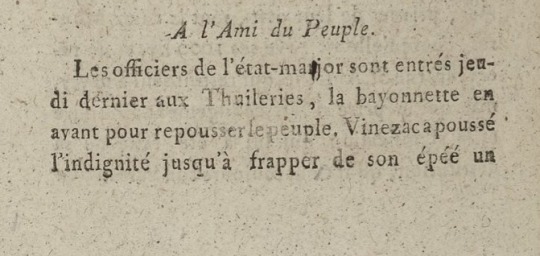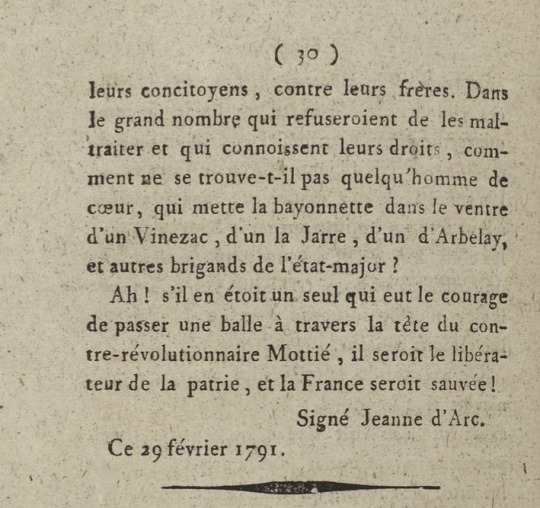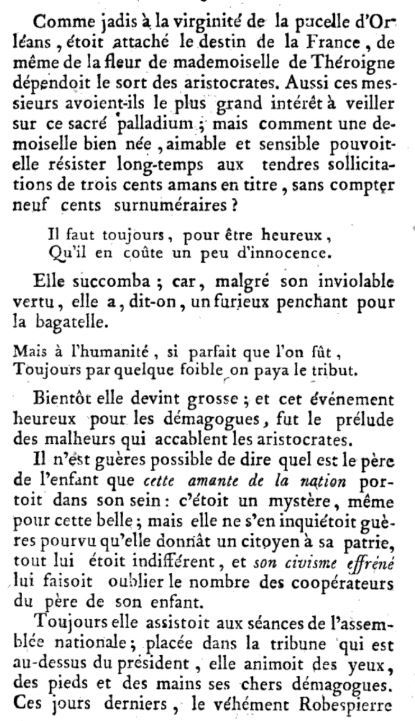#marat anedoctes
Text
Marat et Le Junius Français
I know it's been a while since I've done a post like this one, but that doesn't mean I've lost interest in writing about little-known anecdotes and adventures of Marat! One of them is the brief and chaotic existence of Le Junius Français, one of Marat's lesser-known newspapers, which he created and published during the month of June 1790.
The probable reason why hardly anyone knows that Junius Français existed (the only Marat historian I've ever seen mention it was Olivier Coquard in his Jean-Paul Marat, une lumière en Révolution : biographie d'un homme des Lumières devenu l'Ami du peuple) is that it only had 13 issues in total. Its publication was somewhat turbulent, lasting only three weeks, for obvious reasons. But it is still, in all its context, a very interesting and surprising periodical.
The creation of the short-lived newspaper comes at a complicated and somewhat hectic time for Marat, who had just returned from London in May and was keen to resume publication of L'Ami du Peuple and join the patriotic press. As usual, Marat had to remain underground, as he continued to be the target of legal proceedings and arrest warrants and the publication of L'Ami du Peuple was, unsurprisingly, banned by the authorities. In addition, there was also a constant fight against forgers - the fake Marat, plagiarists who published newspapers and pamphlets under his name, which may also confirm the influence and popularity he had gained at the time. These forgeries of L'Ami du Peuple began to appear in large numbers from 1790 onwards, and Marat made an effort to defend himself against them as soon as he returned to Paris. Not only him, but the Revolution in general was going through a turbulent situation. There had been conflicts involving bakers and grain, the question of war and federations, as well as other external crises that concerned France.
It was against this backdrop of accusations against conspirators, clandestinity and arrest warrants that Marat created Le Junius Français, a second newspaper, which was published for the first time on June 2, 1790. During its publication, Le Junius Français coexisted with L'Ami du Peuple, and both periodicals were published (almost) every day until the end of the first, in its 13th issue, on June 24.
On the structural aspects of the newspaper, Professor Coquard, already cited above as the main basis of this post, comments in Marat, L'Ami du Peuple [p.243]:
This second newspaper presents itself exactly like L'Ami du Peuple: an eight-page in-oitavo printed on poor quality paper that comes out of the workshops of "Guilhemat et Arnulphe, printers of Liberty, at 23 rue Serpent" and is distributed - door to door only - "every morning at number three rue Contrescarpe-Dauphine". Junius seems to focus more specifically on articles of denunciation, while L'Ami du Peuple is probably looking for more general political analysis. However, the two sheets are quite similar.
The name chosen by Marat for the newspaper, "Le Junius Français", also intrigued me. I found in this note apparently (?) written by G. Eljorf through Le gazetier révolutionnaire, a catalog of periodicals of the time, an explanation that seemed to me quite plausible and accurate about the title:
Lucius Junius Brutus and Marcus Junius Brutus are two figures from Roman history engaged in the struggle against tyranny, that of Tarquin and that of Caesar respectively. The pseudonym Junius had been used by an anonymous English pamphleteer around 1770 in a series of letters critical of the government of George III (Junius Letters).
We can speculate on various reasons why Marat might have created the newspaper in such a complex period. Perhaps it was one of his skillful political strategies to amplify his attacks on his enemies at a time of difficulty, but it could also have been the start of a newspaper that Marat actually planned to maintain, so that he could give L'Ami du Peuple another direction. The intentions and objectives of Junius Français, at least, are clearly explained on page 8 of the first issue:

This journal is particularly intended to follow the deaf maneuvers of the revolution's enemies, to reveal their relations with foreign cabinets, to vent the plots of traitors to the Fatherland, to serve as a cry of alarm, to disconcert their dark schemes.
The history of its sessions will be followed by reflections adapted to the subject, portraits of the authors of the most important motions, of the ministers and of the most remarkable figures in the history of the revolution. Finally, it will report on new events likely to pique public curiosity.
In fact, at least in the first issue - which I analyzed more meticulously than the others - he does what he says. He first scolds the Parisians, in the same fraternal and unmistakable style as L'Ami du Peuple, and then recounts the May 31 session of the National Assembly, where a case of conflict between the grenadiers of the Royal Navy regiment was discussed in which a group of patriots had been brutally mistreated. He speaks briefly about the decisions concerning the civil organization of the clergy and denounces the Dutch. He constantly maintains the spirit of denunciation, calling on the people to take revenge. Although his name only appears in 4th issue, it's not hard to spot Marat's pen in every word.
Marat unfortunately didn't manage to keep publishing Junius Français for long. Certainly, the newspaper ceased publication at the end of June for a number of reasons, and among them there is no doubt that Marat must have been overwhelmed with writing and managing the printing and correspondence for two revolutionary periodicals at once. Expenses, lack of time and problems involving the printers of both Junius and L'Ami du Peuple must have contributed to the sudden demise of this newspaper.
I found it interesting to bring up Junius Français because, as well as being one of Marat's most unknown and neglected works, it is also one of his writings that impresses me the most, since he managed to keep both newspapers going at the same time in a chaotic context in which he had to hide from the police, manage the publication of other of his works, solve plagiarism problems and at the same time pay attention to the political situation in France, which was becoming increasingly tense. His commitment, his incessant dedication to producing even in the most difficult and theoretically impossible times is always fascinating, to say the least, and Junius Français is an example of how Marat's revolutionary activity was frenetic and tireless even underground and under threat from the government. His attempt to maintain the two newspapers, despite failing, went beyond Marat's own limits and was, in a way, a good propaganda tool against his political enemies.
#marat#le junius français#marat anedoctes#jean paul marat#frev#french revolution#my posts#btw i swear i'm working on the next le docteur marat post!#i'm moving at the moment and i'm not as persevering as marat so it's been a bit difficult to write 😆#i'm also preparing a list of the addresses where he took refuge in his escapes from the police during the revolution!
30 notes
·
View notes
Text
When Marat meets Jeanne D'Arc
This is a little Marat anecdote that I discovered recently, reading some of the issues of L'Ami du Peuple: apparently, Jeanne d'Arc has been venturing into revolutionary France as a true patriot - she even appears in Marat's newspaper!
In February 1791, Marat received letters from a certainly somewhat mysterious person who signed them "Jeanne d'Arc". In the March 4 issue, Marat displayed one of the letters in L'Ami du Peuple, along with some other letters he had also received:



Jeanne d'Arc's letter denounces the Marquis de La Fayette in particular, and also recounts an episode in which his officers apparently violently intimidate some citizens in the Tuileries. In the letter, she refers to La Fayette as 'Mottié', which was also the way Marat used to call him in his newspaper. I'm not sure if it was Marat himself who changed his name to 'Mottié' when transcribing the letter or if it was actually originally written that way. In any case, it's interesting and a little funny to think that Marat might have induced other citizens to "defame" La Fayette by calling him by his family name. Here's a rather poor translation I made of the letter itself:
"The officers of l'état-major entered the Thuileries last Thursday, bayonets out to repel the people. Vinezac pushed the indignity to the point of striking a peaceful citizen with his sword, another citizen who blamed this violence was arrested by the aide-de-camp who usually accompanies the king's wife: but the people soon forced him to release him. A cent-suisse assured me that yesterday they had a man in bourgeois dress at their head to command them; he added that Mottié was a scoundrel who was betraying us; and that l'état-major was made up of nothing but brigands who had sold out to him. Mottié was heard to tell the king "that he had nothing to fear from the populace, that he was going to make them see that this scoundrel was not ready to reason, that the Parisian guard was devoted to him, that he had them marching to the beat, and that he would reply that everything would go as he might wish": a discourse that he had held at Gutgnart dit St.-Priest, when he wanted to withdraw. He knows you, Badauts, this vile scoundrel; he treats you as automatons who do his bidding, as brute beasts who know only the voice of your leaders, as ferocious satellites who would disembowel your mothers, and he does you justice. This is only for the flat soldiers who blindly obey their officers, against their fellow citizens, against their brothers. Among the large number who refuse to treat them badly, and who know their rights, how can there not be someone with a heart, who will put the bayonet in the belly of a Vinezac, a la Jarre, a d'Arbelay, and other brigands on l'état-major? Ah! If only one of them had the courage to put a bullet through the head of the counter-revolutionary Mottié, he would be the liberator of the fatherland, and France would be saved!
Signée Jeanne d'Arc.
Ce 29 février 1791."
Curiously, this is not the only time that Jeanne d'Arc appears in L'Ami du Peuple. In the issue of February 13, 1791, Marat briefly evokes her, praising her and asking her to get in touch.

"Warning.
The excellent patriot who signed her letters Jeanne d'Arc, is asked to give her well hidden address to the doorman of the Hotel de la Faudriere, rue de l'ancienne Comédie. We have something interesting to pass on to her: until now, she has been advised to remain silent, and we wish to obtain information on the important facts she has denounced. We will gratefully receive her new information,
Marat, l'ami du peuple."
It's not known whether Jeanne d'Arc passed her address on to Marat or whether they actually got in touch, as I couldn't find any other record in his newspapers, pamphlets or correspondence that mentioned her. Apparently, her identity was never revealed either and, considering that Marat received numerous letters from various readers of L'Ami Du Peuple, it is practically impossible to deduce who the real person behind these letters was. However, it is clear that she did at least pass on important information to Marat.
Doing a bit more research on the subject, I came across a short thread by historian Paul Chopelin on Twitter, in which he talks about this anecdote. According to him, the year before Jeanne d'Arc appeared in Marat's newspapers, the "Chronique du Manège", a royalist newspaper, mocked the militant activist Théroigne de Méricourt, calling her an "anti-Jeanne d'Arc". In this context, the Jeanne d'Arc who wrote to Marat may have adopted this pseudonym as a way of avenging Madame de Méricourt... Who knows!?


Although there is no concrete proof that can tell us who the mysterious person who signed her letters to Marat as Jeanne d'Arc really was, there is no doubt that this is all very fascinating: It shows us, in the end, that Marat really did have all sorts of people in his secret network of informants and patriotic companions!
33 notes
·
View notes